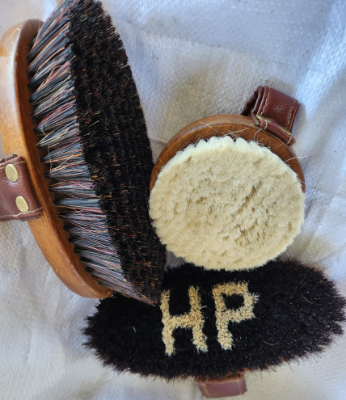No matter which brushes you choose to use on your horse, looking after them so they last a long time and do their job is important.
Brushes are designed to clean your horse. Brushing your horse with a dirty brush means you are transferring that dust, sweat and dirt back to your horse’s coat which defeats the purpose! Ideally you are using a curry to clean the brush after every few strokes which removes the dust and sweat from the brush but over time, the grime will build up in your brush. If you neglect them long enough, dirty brush bristles will begin to clump together, becoming even less effective for cleaning your horse. Keeping your brushes clean not only means they do their job properly and last longer, it also means you are reducing the build-up of bacteria.
If for any reason your horse ends up with some kind of skin issue, do NOT use that brush on any other horse until the skin issue has been resolved and the brush disinfected otherwise you risk spreading that skin issue to another horse. Using something like chlorhexidine would be suitable in this situation. It will kill any germs but not be too strong and harm the bristles on your brush.
The type of brush you have will determine how you wash it. For all brush types, use your curry prior to washing to remove as much hair and dirt as you can.
Synthetic bristles with a plastic back
These type of brushes don’t really need any special kind of care. You can use whatever soap solution to wash them and leave them to soak in a bucket without any issue. Some people even put them in the top drawer of the dishwasher! These type of brushes can also be washed in a bag in the washing machine if you so desire. It is advisable to NOT use the spin cycle.
You can either put a squirt of the soap you are going to use straight onto the wet brush, use your fingers to massage and scrub the soap into the bristles, then rinse thoroughly, or you can put some soap in a bucket with some water and chuck them all in there to soak for a bit. Leaving them to soak is a good way to do a number of brushes all at once and will use less soap. You may still need to soap and scrub the odd one if it is really grubby. Rinse thoroughly with clean water and put them on a clean towel, bristles down or on their side, to air dry. Putting them in the sun would be fine.
Synthetic bristles with a wooden back
As above you can use any kind of soap you like on these bristles. To ensure the longevity of the wooden back, do not soak these type of brushes in a bucket or put them in the dishwasher or washing machine. Wood does not respond well to being soaked or overly wetted on a regular basis. As a one off here and there it would be fine but only if absolutely necessary. Put a squirt of the soap you are going to use straight onto the wet brush, use your fingers to massage and scrub the soap into the bristles, then rinse thoroughly. Put them on a clean towel, bristles down or on their side, to air dry. Keep out of the sun so the wood doesn’t dry rapidly and risk cracking.
Natural bristles with a wooden or synthetic back.
Natural bristles need more care than synthetic bristles if you want them to last as long as possible. I will only use a shampoo to wash natural bristles that I am prepared to use on my horse. Do not put them in the dishwasher or washing machine. Again, as above to ensure the longevity of the wooden back, do not soak these type of brushes in a bucket. Put a squirt of the shampoo you are going to use straight onto the wet brush, use your fingers to massage and scrub the soap into the bristles, then rinse thoroughly. Put them on a clean towel, bristles down or on their side, to air dry. Keep out of the sun so the wood doesn’t dry rapidly and risk cracking.
How often should you wash your brushes?
It depends on a number of things.
- How many horses they are being used on
- The time of the year. Typically winter brushing removes more mud than summer brushing
- The type of brush. A dandy brush would be used to remove more dirt than a polishing brush
Do they look grubby and dusty? Time to wash them
Haven’t washed them for 3 – 4 months and they’re used regularly? Time to wash them.


